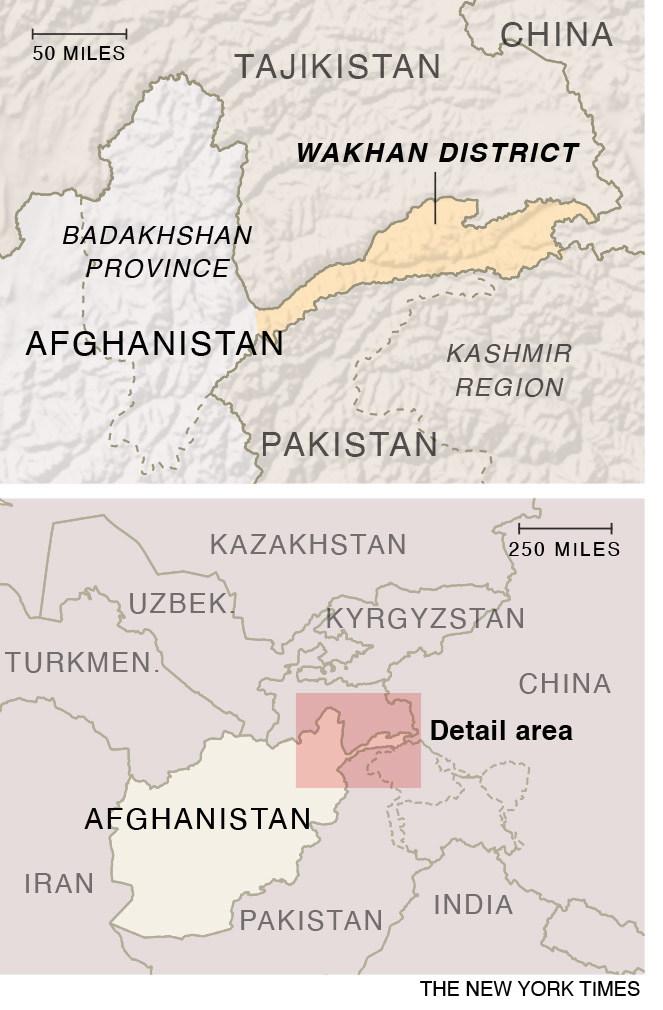They set out at night with their camels, yaks, and yurts in search of safety from a war finally arriving in their mountain homeland.
In one of the more peculiar disruptions touched off by the U.S. military withdrawal from Afghanistan, about 350 ethnic Kyrgyz nomads tried to flee the country this month into Tajikistan. Traveling with about 4,000 head of livestock, the herders spent nearly two days traversing a roughly 15-mile mountain pass.
Ultimately, they were forced to return after their appeal for asylum fell through — but not before touching off a diplomatic dispute and illustrating how the turmoil in Afghanistan is unnerving northern neighbors worried about the sudden arrival of refugees and the prospect of cross-border violence.
The caravan of Kyrgyz fleeing the Wakhan Corridor in northeastern Afghanistan is a case in point. The corridor, a high-altitude panhandle wedged between Tajikistan, China, and Pakistan, had remained peaceful throughout the two-decadelong U.S. military presence.
But this summer the settled areas of its province, Badakhshan, largely fell to a Taliban advance, setting off fears among the nomadic herders that their home would be next.
“The Kyrgyz do not believe the Afghan government can protect them,” said Bunyamin Toker, director of the World Association of Pamir Kyrgyz, named for the herders’ home in the Pamir Mountain range.
Toker, who has been in touch with the migrants sporadically via cellphone, said the Taliban have already sent envoys into the Wakhan Corridor. The envoys told the Kyrgyz they could continue their pastoral lifestyle, he said, but they also made a point of counting the animals, raising concern that they intended to tax or confiscate the livestock.
The Taliban have not yet entered the area with force, Toker said, but the Kyrgyz believe a newly constructed road makes a military operation there possible — one that could bring Taliban control to Afghanistan’s 28-mile-long border with China for the first time.
The Kyrgyz are one of Afghanistan’s smallest minorities, about 2,500 largely illiterate herders who eke out a living raising sheep, yaks, horses, and camels on the high-altitude pastures near the Chinese border. A remnant of centuries-old population movements in Central Asia, the group is separated from its ethnic brethren in the nation of Kyrgyzstan by the country of Tajikistan.
The Kyrgyz adhere to a moderate form of Islam and, like other ethnic minorities, risk repression if the Taliban regain power. They had long benefited from the security of the U.S. military deployment, Toker said.
But the U.S. military presence has shrunk to a small garrison to protect the embassy in Kabul, and the Biden administration has said it will be pulled out altogether before the 20th anniversary of the Sept. 11 attacks.
And with that, the safety of the Kyrgyz nomads is unclear. The Taliban now threaten most of Afghanistan’s 34 provincial capitals and even Kabul, the national capital. The insurgents have overrun more than half of the country’s 400 districts and many important border crossing points, including ones leading to the former Soviet nations in Central Asia.
As the main focus of their offensive that began in May, the Taliban have been sweeping through northern Afghanistan, home to many ethnic minorities who fear persecution.
Unfortunately for the Kyrgyz herders, isolated for centuries in their mountain redoubts, China just this year pushed ahead with the construction of a road through the Wakhan Corridor as part of its ambitious Belt and Road infrastructure and investment project.
The Wakhan Corridor road, partially completed, now opens a route for a possible Taliban advance, Toker said.
“The elders decided the Taliban would come to the Pamir Mountains” and decided to get out before that happened, he said. They left at night to avoid tipping off Taliban scouts.
“If the Americans were still in Afghanistan, the Kyrgyz would be safe,” Toker said. “It was not right that they decided to leave in a hurry. If the Americans decided to leave, they should have set up stability first. Now it’s just chaos.”
When the Kyrgyz showed up at the Tajikistan border July 13 and 14 with their herd, including Bactrian two-humped camels laden with bundles, the Tajik border patrol initially let them enter.
The herders said they wanted to either remain in Tajikistan or travel on to Kyrgyzstan, according to a video interview by local reporters. And the Kyrgyz government offered the entire group asylum, seemingly opening a path.
But within a week, the Tajik government rejected the herders’ appeal and sent them back into Afghanistan, saying the central government in Kabul had guaranteed their safety. Although the government of Kyrgyzstan issued a statement of complaint, saying its diplomats had conveyed “concern and corresponding requests” for asylum to Tajik authorities, the pleas were ignored.
Tajikistan’s decision reflects its growing wariness of refugee arrivals. Starting in June, Afghan government soldiers have taken to fleeing to Tajikistan as the Taliban have overrun their positions. Arriving in trickles and pell-mell retreats, several hundred soldiers have crossed the border, prompting Tajikistan to put them on flights back to Kabul.
Uzbekistan, which also shares a border with Afghanistan, is bracing for instability by planning military exercises together with Russia along the frontier. The Biden administration has asked Uzbekistan, Kazakhstan, Kyrgyzstan, and Tajikistan to accept as many as 9,000 asylum-seekers.
The Russian government has been adjusting, too. It’s military this month deployed tanks to the Tajik border with Afghanistan and has overflown the region with ground-attack jets, ostensibly on training exercises. Tajikistan is in a military alliance with Russia, the Collective Security Treaty Organization.
“With the United States and its allies departing from the country,” wrote Dmitri Trenin, director of the Moscow Carnegie Center, “Afghanistan becomes a problem for the neighboring states.”
This article originally appeared in The New York Times.


